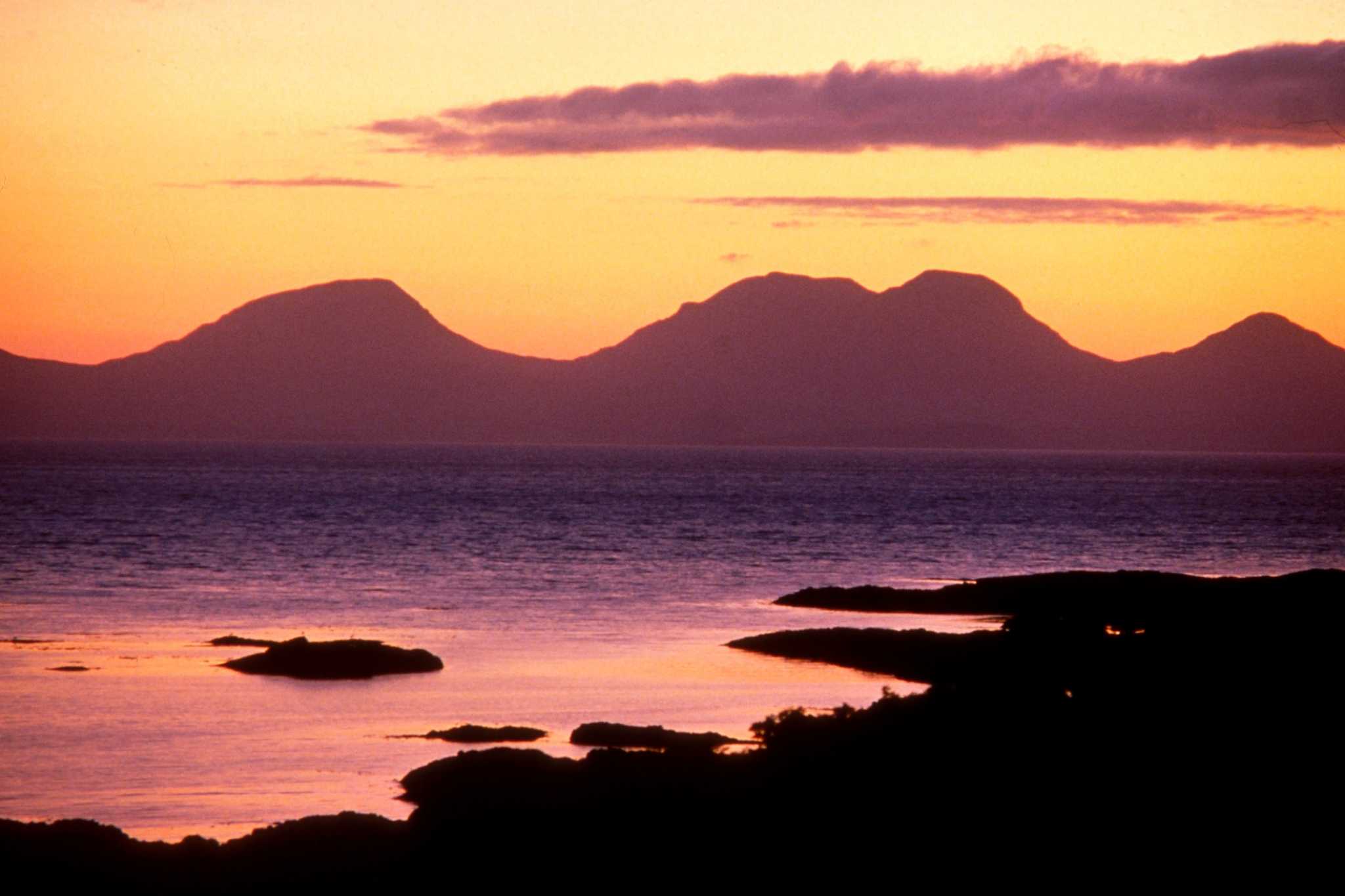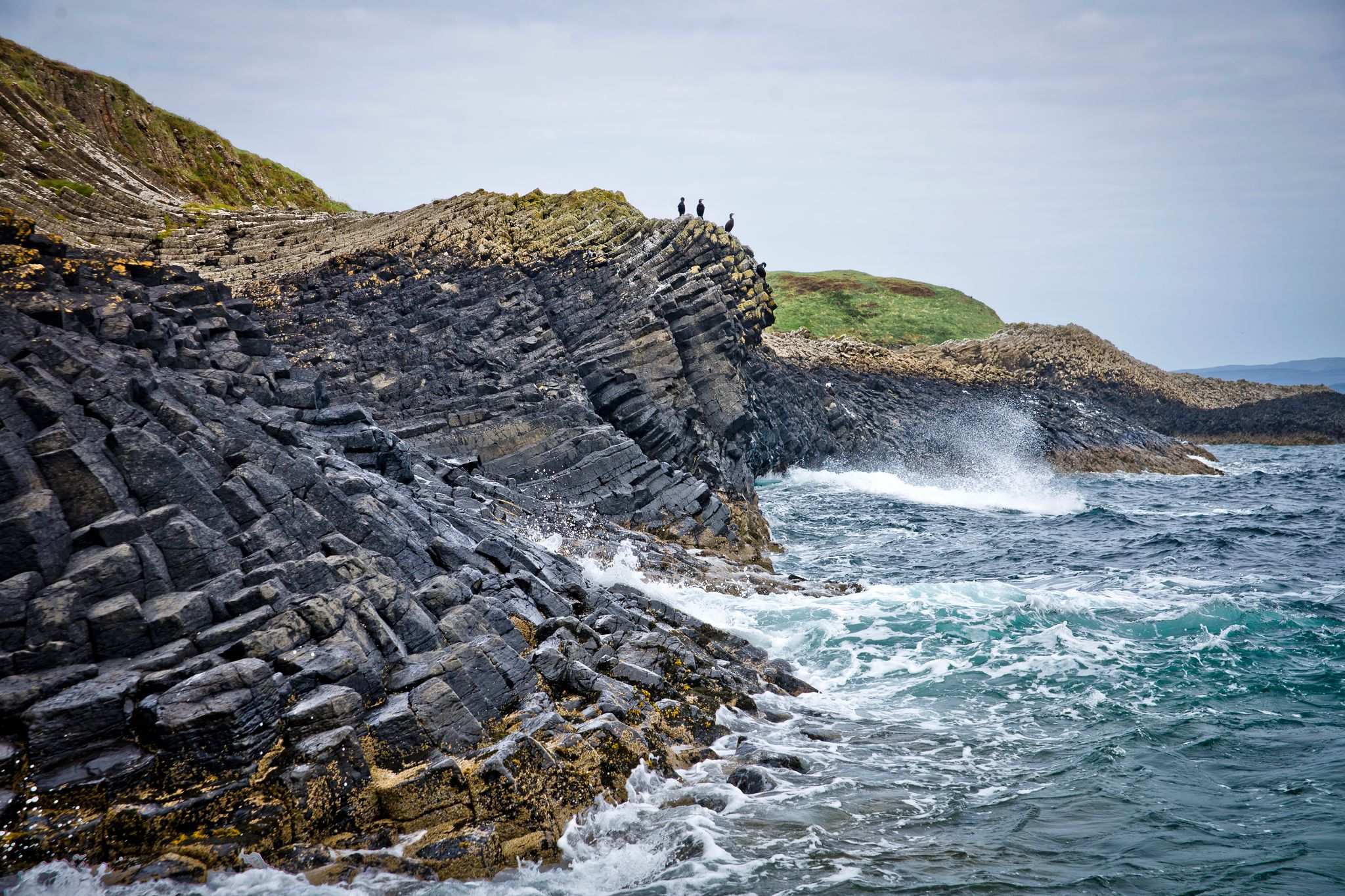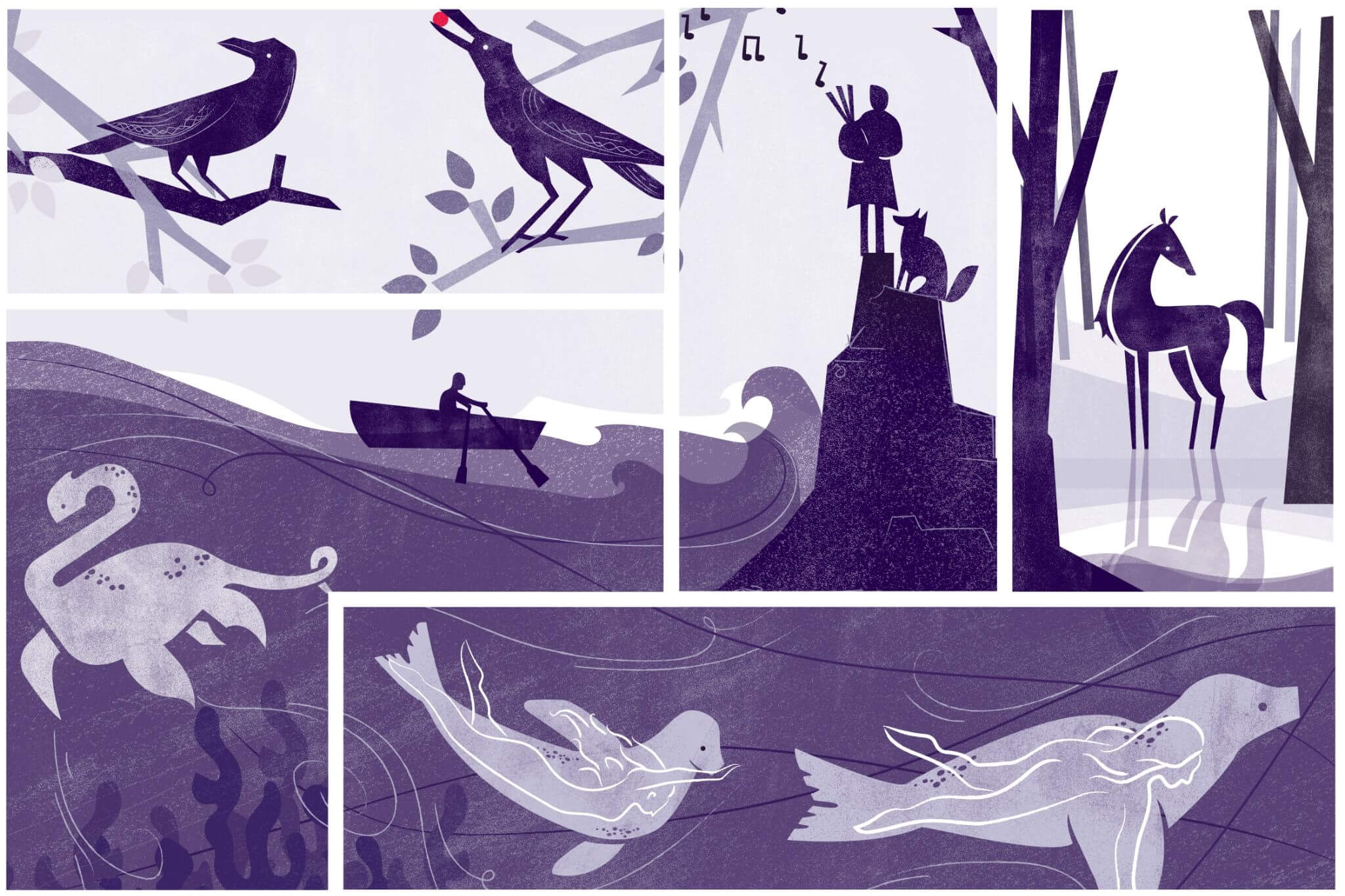BETA: The search and map are new features with further enhancements planned. VisitScotland is not responsible for the content of external links and accepts no liability for any reliance on these.
- Home
- Things to do
- 9 of Scotland's most inspiring spots
9 of Scotland's most inspiring spots
With dramatic landscapes, remote escapes and captivating tales, it’s no surprise that Scotland has enchanted famous writers, artists and musicians.
Spark your own imagination with our list of inspiring spots across Scotland that have influenced some of the world’s greatest stories.
The following list was created by VisitScotland to showcase a range of experiences. It isn’t ranked in any specific order.
- 1
Bram Stoker's Dracula
Slains Castle, Aberdeenshire
Slains Castle at sunset.
Perched dramatically on the edge of the cliff at Cruden Bay, Slains Castle on the Aberdeenshire coast has a legendary reputation as the gothic ruin that inspired Dracula. Bram Stoker regularly visited the area, drawing inspiration from its eerie atmosphere for the lair of his infamous villain. The castle ruins and their lonely position stir the imagination, especially on a windy and wild day. Other famous literary visitors include Samuel Johnson and James Boswell, although their descriptions of the castle are a little less chilling than Stoker’s tale!
Follow in the author’s footsteps and walk the coastal trail up to the castle from the picturesque Cruden Bay village, which provides the setting for some of Stoker’s other works. You can even stay at the nearby Kilmarnock Arms Hotel, where Bram Stoker himself was a frequent visitor.
Please note the castle is a ruin, so be sure to follow instructions for site safety and accessibility information.
- 2
George Orwell
Isle of Jura

The Paps of Jura at sunset
© VisitScotland / Paul Tomkins
George Orwell, known to islanders by his real name of Eric Blair, lived on Jura for three years. He felt deeply connected to what he described as the extremely “un-get-at-able place”, where the wilderness and isolation unlocked his creativity and enabled him to focus on writing his final and most famous novel. The remote island in the Inner Hebrides still offers glorious escapism for visitors – its rugged and rural landscape is constantly shifting and stirring the imagination.
The island is home to Jura Distillery and Lussa gin, who rather appropriately believe “isolation is inspiration”. Cosy up with a comforting dram of your favourite island tipple, your copy of 1984 and get inspired by Jura.
- 3
Fingal's Cave
Isle of Staffa

Staffa and Fingal’s Cave
Formed from hexagonal, volcanic basalt columns that rise up from the churning sea, this enchanting cave has inspired many famous figures. Poets and artists including Sir Walter Scott, J.M.W. Turner, Tennyson, Wordsworth and Keats have all been captivated by the natural phenomenon. Its cathedral-like atmosphere and acoustics also moved Mendelssohn to write his famous Hebrides Overture and have even inspired a Pink Floyd song!
Staffa has influenced a number of myths and stories, adding layers of inspiration to an already enthralling environment. Legend has it that the cave forms one end of an ancient bridge to the Giant’s Causeway in Ireland, created by the giant Fionn mac Cumhaill. James Macpherson popularised this tale in his Ossian Cycle, resulting in the first use of the name “Fingal’s Cave”.
You’ll easily be able to see why Staffa has inspired so many great works of art, but it’s also worth a boat trip for some nature spotting. It’s a designated National Nature Reserve, where you can see black guillemots, fulmars and puffins.
- 4
Robert Burns
Falls of Foyers, Loch Ness
Falls of Foyers
© @byronbizzle
On the quieter south side of Loch Ness lie the captivating Falls of Foyers. The story goes that when Robert Burns discovered the falls on his tour of the Highlands he was so instantly inspired by the “rising mists and ceaseless showers” that he wrote his famous lines on the spot. A popular tourist destination in the 18th and 19th century, Foyers was an essential stop on the Romantic tour of Scotland, also visited by Johnson and Boswell, Wordsworth, Coleridge and J.M.W. Turner.
The spectacular waterfall cuts dramatically down a gorge in the middle of the surrounding woodland, like something from a fairy tale. Whether the water is glittering in the sunshine or swirling darkly in a storm, watching the waterfall is a mesmerising experience. The walks around Foyers are brimming with wildlife, tall birch trees and stunning views of Loch Ness, so it’s not just the waterfalls that could stimulate your imagination. Make sure you take a pen and paper in case you find yourself as inspired as the National Bard!
- 5
Beatrix Potter's The Tale of Peter Rabbit
Dunkeld and Birnam, Perthshire
The Birnam Oak in spring
Beatrix Potter is often associated with the Lake District, but she had strong Scottish links and her children’s books were heavily influenced by summer holidays in Perthshire. Every year, her family would spend months soaking up the serene surroundings of the Scottish countryside, next to the gentle banks of the River Tay and ancient forests. The Tale of Peter Rabbit was first conceived here, and Beatrix included references to the locals in the figure of Mr McGregor. She borrowed his name from the laird who owned their holiday home and his appearance from the local postman.
Discover Birnam Arts Centre (which the Potter family originally helped fund) to see your favourite characters in the garden, or walk to the famous Birnam oak which has another literary connection – the last tree from the ancient wood featured in Shakespeare’s Macbeth! You can also stay on the sunny banks of the Tay in the pastel pink Eastwood House, where Beatrix composed the letter that first mentioned Peter Rabbit.
- 6
Mary Shelley's Frankenstein
Dundee
The Dundee Skyline and Tay Bridge Seen From Newport
Dundee is a city known for its cutting-edge technology and design, but it also has some illustrious literary connections, inspiring one of the best gothic tales of all time.
A teenage Mary Shelley spent over a year here living with friends near the harbour, overlooking the silvery shores of the Tay and described Dundee as “the pleasant region where unheeded I could convene with the creatures of my fancy”. Tales of ice and arctic waters brought back by local fishermen in the whaling industry must have lingered in her imagination, which she used in the opening scenes of Frankenstein.
Visit the “Frankenstein Steps” which lead to the site of the cottage where Mary stayed during her time in Scotland, or take a walk along the vibrant harbour to see how she would have viewed the city.
- 7
J.K Rowling's Harry Potter series
Edinburgh
Victoria Street in Edinburgh
© VisitScotland / Kenny Lam
J.K. Rowling has a deep connection to Scotland and its capital city, where she still lives. The writing of the world-famous Harry Potter series started in a small Edinburgh café and concluded in the Balmoral Hotel, but Rowling also had many haunts around the city that directly inspired the settings and characters of the series. Greyfriar’s Kirkyard is perhaps the most famous – with its crooked graves and spooky atmosphere it’s like stepping right into the wizarding world. Rowling also drew inspiration from the graves themselves, including the names McGonagall and Tom Riddell.
Wandering around Edinburgh never fails to engage the imagination. It’s a city of hidden closes and cobbled streets, full of history and striking architecture. Explore the colourful shopfronts of the winding Victoria Street to feel like you’re in Diagon Alley, or warm up with a pint of Butterbeer in The Dog House.
There are plenty of other famous writers who were captivated by Edinburgh, including Robert Louis Stevenson, Muriel Spark and Arthur Conan Doyle.
- 8
John Buchan's The 39 Steps
The Scottish Borders
The Cheviot Hills
The Scottish Borders are the star of John Buchan's famous thriller, The 39 Steps. Buchan stated that his “chief passion was for the Border countryside, and my object in all my prentice writings was to reproduce its delicate charm”. The protagonist, Richard Hannay, escapes from London and up through Dumfries and Galloway and the Scottish Borders, using the remote hills and glens to hide from his pursuers. Other well-known Scottish authors including Sir Walter Scott, James Hogg and James Thomson also found inspiration in this picturesque landscape, which is full of rich history and legends.
Set out on your own epic adventure through the Scottish Borders to experience its beauty first-hand, and discover more about the fascinating life and work of the author at the John Buchan Story Museum in the quaint town of Peebles. There are also plenty of film locations to explore from the iconic Hitchcock adaptation, including Glen Coe and the Forth Rail Bridge, a UNESCO World Heritage Site.
- 9
Alasdair Gray
Glasgow
Glasgow Necropolis
Glaswegian-born writer and artist Alasdair Gray was continuously inspired by Glasgow and its iconic cityscape. Lanark, his most-acclaimed novel, features many realist and surrealist descriptions of the city, including depictions of the city’s Necropolis, Glasgow Cathedral and the unwieldy motorway that winds through Glasgow. The engaging and creative city has a strong artistic heritage. Gray attended the renowned Glasgow School of Art, whose past students include Liz Lochhead and Charles Rennie Mackintosh. The Kelvingrove Art Gallery and Museum hosts great examples of local artwork.
Alasdair Gray’s influence remains integral to Glasgow. Be inspired by his famous murals in Òran Mór, the Ubiquitous Chip and the Hillhead subway station. The city continues to remain at the forefront of Scotland’s music and art scene, so get your creativity flowing by following the mural trail.
Other things you might like
Film & TV locations in Scotland
Scottish writers & literature

Discover Scottish myths & legends

18 Braw Scottish words & their meanings
10 Gaelic place names & their meanings
Join our Newsletter Clan
Get Scotland inspiration direct to your inbox. Don't miss the inside track from our Scotland experts on exciting trip ideas, unique attractions and hidden gems loved by locals.